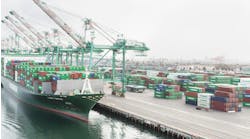Seven years ago many electronics companies scrambled to provide documentation that showed their equipment complied with the European Union's Restriction on Hazardous Substances (RoHS) law. The directive restricts the use of lead, cadmium, mercury and three other substances in electronics equipment.
Electronics OEMs had to show that their equipment complied with the law if they wanted to avoid fines and continue to sell products in EU countries.
Next year, many U.S. electronics companies may be scrambling to show compliance to conflict minerals regulations covered under the 2010 Dodd Frank Wall Street Reform and Consumer Protection Act. Section 1502 of the law requires companies to disclose to the Securities and Exchange Commission (SEC) if their products contain tantalum, tungsten, tin or gold mined in the Democratic Republic of Congo (DRC) or nearby countries in central Africa. Rebels in the DRC have used proceeds from conflict minerals illicitly mined to fund their war efforts.
Unlike RoHS, there are no penalties for non-compliance and there is no ban on use of the substances under Section 1502. It is a disclosure requirement to determine whether products contain conflict minerals.
While many suppliers, distributors and analysts initially thought it would be difficult to comply with the conflict minerals rules, many now believe that showing compliance will not be as onerous as first thought. A "bag and tag" program, which follows the transport of minerals from the mine to the smelters, has been put in place to verify the origin of the minerals. In addition, smelters that process the raw materials have also been audited by the Electronics Industry Citizenship Coalition to guarantee the smelters don't use conflict minerals.
The conflict mineral regulations are the latest example of the growing number of compliance rules that the electronics industry faces. Many in the supply chain say that although many of the regulations are well-intentioned, they are costly to the industry.
They point to export compliance regulations, many of which are designed to keep products out of countries that the United States has issued embargoes against including Iran, North Korea and Cuba.
“Export compliance is a huge additional cost in our business. It has affected our bottom line dramatically,” says Scott McClendon, president of Allied Electronics in Fort Worth, Texas.
Export compliance regulations are not new, but enforcement of them has increased and penalties for non-compliance are severe, he says.
Allied is owned by RS Components, a United Kingdom-based company.
“If we ship a product to one of our warehouses in the UK, that product has to follow U.S. export compliance rules and regulations" no matter where it is sent in the world. He says U.S. export regulations are the strictest in the world.
He adds that such regulations are costly, but they also slow down introduction of new products into the market.
The good news for buyers at electronic OEMs and EMS providers is that component manufacturers and distributors often have the information needed to show compliance regulations. They can also provide useful information about existing or upcoming regulations concerning export, the environment and social responsibility that may be in the works.









